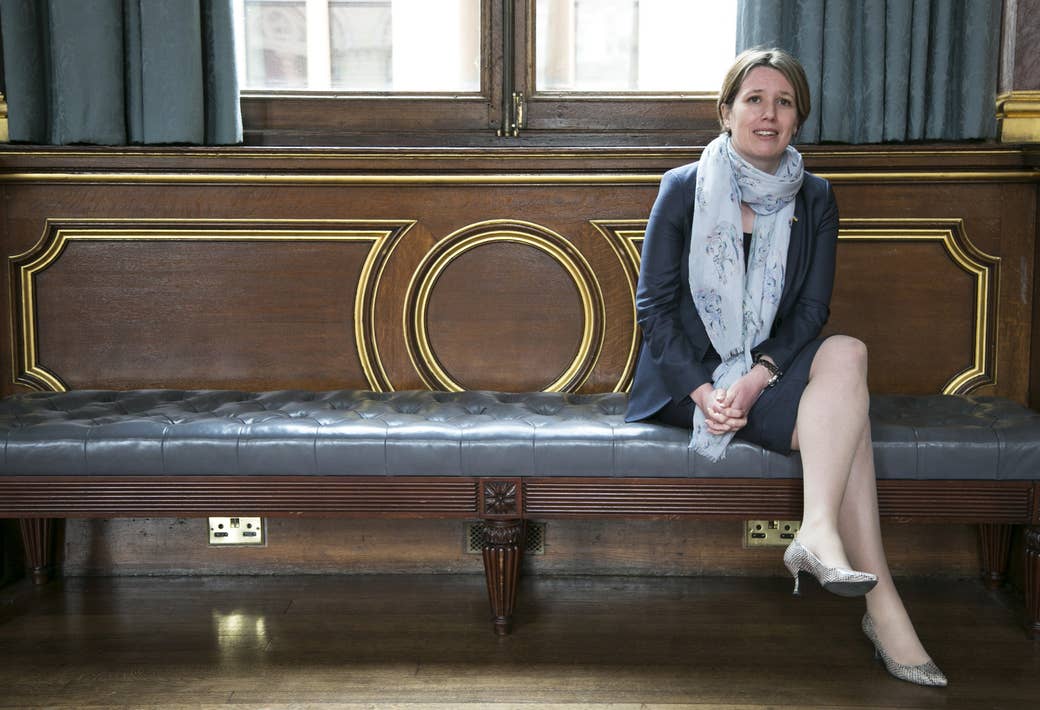
Everyone is tense and pretending not to be. Judith Gough, the British ambassador to Ukraine, appears from nowhere in a corridor at the Foreign Office, tall, striding, hand outstretched. She has the mannered air of a BBC newsreader – breezy, graceful, with immaculate deportment – which almost conceals the sense that she is paddling furiously beneath the surface.
The Foreign Office press officer, meanwhile, is paddling furiously on the surface. This, it seems initially, is due to a sincere desire to ensure the interview unfolds without a hitch, but rapidly escalates on account of the fact that hitches start befalling us at every turn.
The lift will not take us to the third floor where our designated room awaits. Or the next lift. Or the next. The staircase is blocked off. And the next one. The entire floor, unbeknown to anyone, has been closed. Then a door handle comes off in BuzzFeed News’ hand. The press officer looks mortified. He apologises. When we try to get a coffee from the internal café, the queue is too long for us to wait. He apologises again. We walk and walk and cannot find a room anywhere. Finally, BuzzFeed News jokes that perhaps this is all down to a Russian plot to STOP GAYS TALKING. There is polite, awkward laughter.
No one mentions the underlying reason for the tension: Never before has a British ambassador given an interview about being lesbian or gay. There is a small clutch of out British LGBT envoys, and one, David Quarrey – the ambassador to Israel – has mentioned being gay in an Israeli newspaper. But this is the first full discussion with a member of the press about life as an out-and-proud ambassador. It has taken 25 years for this to even be conceivable – and it isn’t until the end of the interview that the real reason for Gough’s anxiousness emerges.
Until 1991, the Foreign Office deemed homosexuality a “character defect”. You could not get a job there if you were gay and if you did and were found out, you would lose it. Official papers and memos that circulated during the 1980s and were unearthed by former ambassador Charles Crawford in 2010 reveal the prevailing attitudes among politicians, advisers, and staff.
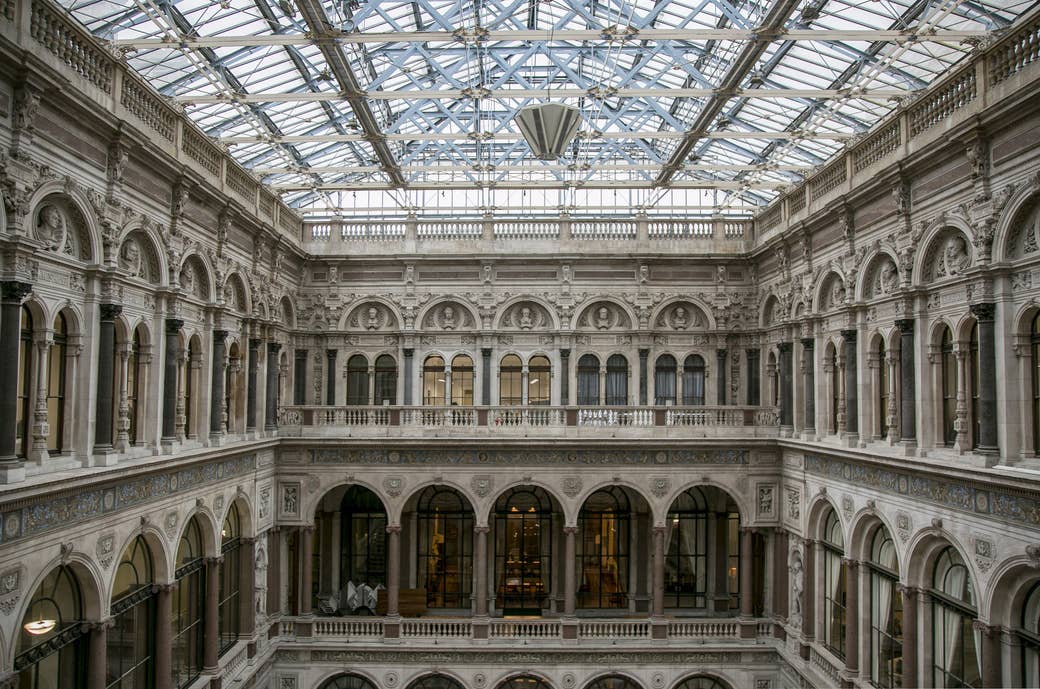
Crawford picked out some choice quotes from these internal documents for his exposé. Homosexuality is described as manifesting in a variety of forms “from inconspicuous stable relationships through promiscuity or exhibitionism to paederasty”. One officer “was given a chance to serve overseas after an isolated homosexual incident [but] has had to be withdrawn as his behaviour was giving rise to an unacceptable level of gossip”.
Gay staff would be “open to compromise if they indulge in unlawful activities, or mix with unsavoury elements in louche bars”, according to one of the documents, and should not be allowed in the service as “homosexuals tended to promiscuity which involved mixing with ‘undesirable elements’ with consequent security implications”.
Today, alas, there is no louche bar, just an echoing space at the bottom of a stairwell – the final resting place for our endless search for an interview room. There is at least a three-piece suite. After just one question, however, the press officer falls through his chair. It is like a sudden collapse of a soufflé. Or an empire. Gough, 43, is unable to control herself. She laughs and laughs, mortified for him and for her inability to close the pressure valve that has been loosened.
“Could anything else go wrong?” the press officer asks as he attempts to free himself from the chair.
Gough has regained composure. We pause for a moment, air cleared, and start again. Diplomats are famed, if nothing else, for gliding through social situations like silver service waiters. But what happens at a reception in Ukraine when Gough is introduced with her female partner?
“You get used to the double take,” she says. “But I get that for a couple of reasons. One is because often when I’m introduced to people they think I am the ambassador’s wife. So I get the double take. I’ve had said to me, ‘Oh, but you’re young and female, you can’t be the ambassador.' And then if you introduce a female partner, yes, you get another double take. But on the whole in those situations people are polite.”
Gough says that in the countries in which she has served – South Korea, Georgia, and now Ukraine – she has not encountered problems from those hosting her but instead “the reaction of other diplomats from other countries. I’ve had some quite biting comments.” BuzzFeed News asks her to specify.
She pauses, eyes moving back and forth. “Erm… That might reveal who they are, but: ‘Somebody like you shouldn’t be posted in a country like this.’ Or: ‘You shouldn’t be doing the job you’re doing.'” These comments relate to her being a lesbian?


“Yes,” she says. “There is a level of difficulty sometimes in dealing with other countries where they do not have the same approach to LGBT issues as we do. But then I’ve also had comments that 'as an ambassador really you should be at home with your children, and not being a full-time ambassador'.”
Gough has two children – aged 3 and 11 – with her civil partner, Julia Kleiousi, whom the Daily Mail once said was a tennis coach. Kleiousi is a civil engineer. Stereotypes are not only evident at ambassadorial receptions. But what does Gough say when other ambassadors fling judgements at her?
“A couple of things,” she begins, “One is: I’m here because I’m good at my job and I have the right expertise, and the second is: I represent the UK and we are a diverse country based on a certain set of values. I therefore reflect that country.” She says it does not happen often but when it does, she retorts.
“There are ways of responding politely, saying, ‘But of course I’m the right person for the job – my government thinks so.'”
Gough’s career began conventionally enough, as a consultant at Ernst and Young.
“In the mid-'90s I believed that I was the only gay person working in the City and then, lo and behold, discovered that wasn’t true at all,” although she did not come out then as she was “much younger and less confident”. But by 2001, when considering joining the Foreign Office, Gough wasn’t concerned about her sexual orientation being a barrier.
“I knew I wanted to be a diplomat and therefore why should I let my ambitions be thwarted?” she says. Her voice has the clipped, quiet authority of someone who knows exactly how to wield power without alienating anyone. It wasn’t only Gough’s sexuality that might have thwarted her goals.
“More uppermost in my mind was the fact that I went to a state school and a university that was not Oxford or Cambridge,” she says. “The impression at that time was that the Foreign Office was only open to people of that educational background.” Now it is much more diverse, she says, but after being accepted, there were other concerns: namely, whether as an openly gay woman she could be sent where she wanted.
“In the early days [after 1991] there was a perception that gay diplomats could go overseas, but much better if they went to Chicago or Amsterdam. But they didn’t really appeal – I like the grittier postings.”
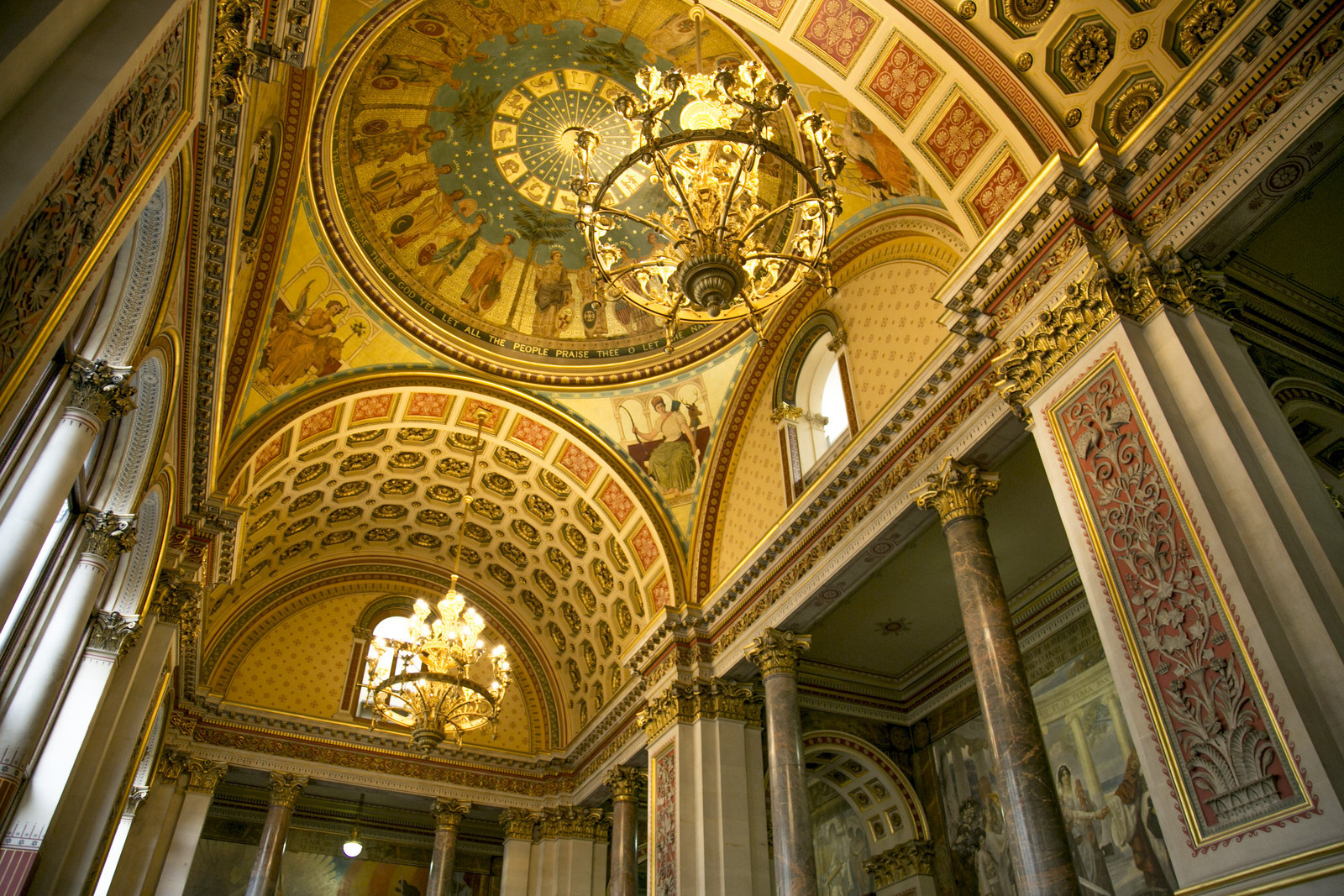
And in the early days after she joined the service, Gough found there were “very few role models” there, in terms of fellow openly gay ambassadors. “My sense was that yes, there were [other gay] people in the organisation, but they were not necessarily open about their sexuality.” Gough, meanwhile, “never felt the need to hide it”.
“I think we have more role models now,” she says. “Do we need more? Yes, of course we do.”
She adds, as if to speak directly to any LGBT people considering joining: “I can genuinely say that within the Foreign Office I have never experienced discrimination or harassment on the grounds of sexuality.” Her tone is proud and upbeat, conveying a sense that this is a remarkable, impressive feature, rather than a department merely not breaking employment laws.
It has taken 15 years in the Foreign Office for Gough to decide to speak about her life, sexuality, and career, and as with much of what is discussed, her reasons trickle out gradually.
“I’ve always taken the view that I would rather be ‘the British ambassador’ and ‘oh, by the way, she’s a lesbian, she’s a mother, she has green eyes’, and there’s a whole set of characteristics that are about me, rather than being ‘the lesbian ambassador’, because I think that pigeonholes me.”
For any facet of identity to become unremarkable, however, requires more people who share it to be visible. Until then, Gough may well be seen as an intrepid LGBT pioneer, which wasn’t – strictly – her intention.
“I have not gone out there and led the charge from the front,” she says, “because I think we are more effective if we are who we are and we introduce the aspects of our personality and character as we go through the role.”
Later, however, as she relaxes a little, we return to her motivation for speaking out now, and something deeper emerges.


“It’s about being able to stand in front of your children and say, ‘This is me, this is who I am,’ and for them to have the confidence in who they are and where they come from. I owe them that. I want them to be comfortable in their own skin.” Will Gough convert her civil partnership into a marriage?
“When we get round to it,” she says. “When you live the lifestyle we live there are lots of things you want to do and get round to – that’s one of them.”
Gough grew up in Buckinghamshire, with “one foot in the countryside, one foot on the underground line to the city”. When BuzzFeed News asks if she was out at school she replies “no”, with a breathy snort that suggests it would have been unthinkable. “1970s Britain was a very different place,” she says. When did Gough come out to herself?
“I have absolutely no idea,” she says, laughing. “I’ve just always been me, if that makes sense?” No, replies BuzzFeed News, to encourage her to explain. Was there not a time when she attached the word “lesbian” or “gay” to how she was feeling?
“I’ve never been comfortable…” she begins, before changing tack. “I don’t know, I think there’s always been a slightly rebellious streak in me that says, ‘Labels are labels, I’m me, and this is who I am.’ So, you know, yes, I’m a lesbian ambassador in Ukraine, I’m a mother, keen mountaineer, you name it, a whole set of circumstances and things. I’ve reached a certain age where I’m just me.”
After more than a decade in the diplomatic service, last year Gough accepted the ambassadorship in Kiev. Was taking a posting in Ukraine, a country beset by anti-gay sentiment and laws, a difficult decision?
“You weigh it up,” she says. “Can my partner work there? Will my children be happy there? Can I exist within that framework in a way that is comfortable for me and my family?”
She adds that the Foreign Office is “pretty good” at providing local information about a post beforehand, and the in-house LGBT staff association, FLAGG, is “excellent at supporting officers”.

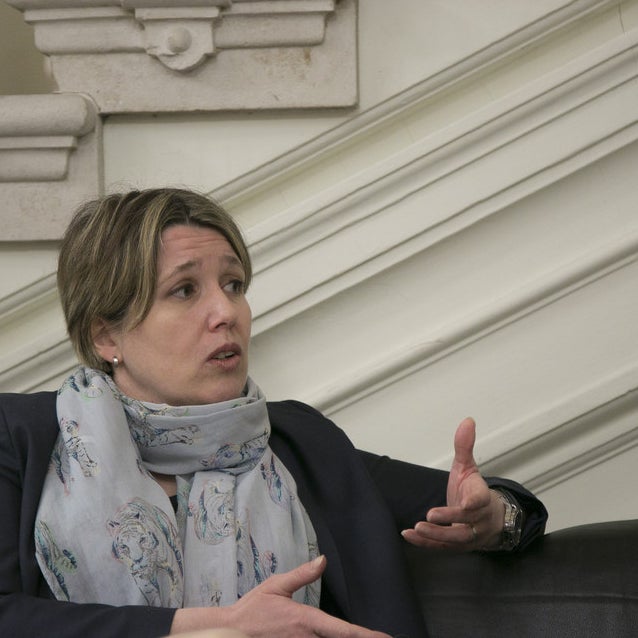
However, the situation in Ukraine for LGBT people remains hostile. There are no laws allowing any form of partnership between people of the same sex and no opportunity for gay couples to adopt. Pride marches have been banned or marred by violence and arrests. Surveys have shown negative attitudes towards LGBT people among the majority of the population. And in the last two years there have been neo-Nazi attacks on gay venues using firecrackers and smoke grenades. Some activists have said the situation is worsening. But is it?
“For LGBT people in Ukraine it is not easy,” she says. “If you look at the level of violence against gay people, there are frequent incidents. And there are very few clear Ukrainian role models. Whether the level of violence has increased or whether the reporting of violence has increased is not clear.”
She starts to talk about some of the LGBT activists on the ground. She speaks of their courage, the “huge personal risk” they take, and mentions the most well-known campaigner, Bogdan Globa, whose address to the Ukrainian parliament in 2013 about LGBT rights and the need for anti-discrimination laws was the first of its kind.
Globa appealed to the somewhat startled besuited politicians on political and pragmatic grounds, but also through a personal plea. He described what life was like for him as a gay teenager in Ukraine. “I was bullied and abused in school,” he said. “I was beaten and chased by older guys. I got driven from my own family because my parents thought that I was ill. I found the strength and courage to go through it, and today I use every opportunity to openly and honestly talk about it.”
View this video on YouTube
Bogdan Globa speaking in the Ukraine parliament.
“Bogdan has done great things,” says Gough. “As a gay man, standing there and addressing parliament was fantastic.”
Last year Globa told BuzzFeed News at a meeting at the Elton John Aids Foundation that Russia’s annexation of Crimea has been partly responsible for an increase in anti-gay violence in Ukraine. He showed footage of thugs storming a gay club – he believes they were put up to it by Putin’s government.
He also played a video of what appeared to be a fake gay pride parade, with what he said were actors carrying rainbow flags and EU flags. It was a stunt, he said, choreographed by Russia to entwine gay rights with the EU in the minds of Ukrainians – an attempt to trigger anti-EU sentiment through homophobia.
But Gough will not be drawn on who is responsible. “It’s very hard to attribute homophobia to any particular force or individual,” she says. “I think what you can say is that there have been those who have politicised LGBT issues as a reason for Ukraine not to have a closer relationship with Europe.”
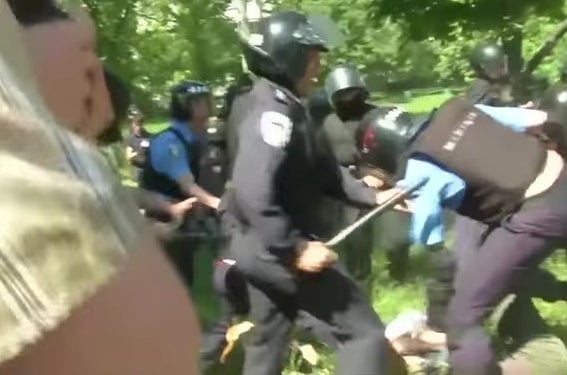

Ukrainian police clash with LGBT people at a pride march.
The British government, meanwhile, has promised to promote LGBT rights abroad. But what is being done to further such rights in Ukraine?
“We have conversations on a range of issues, and one has to be realistic,” says Gough. “When you are working in a country that is facing conflict and economic crisis and when you have 2.5 million displaced people the conversations tend to focus round those issues. [But] there is a subset of conversations and human rights runs through all of that.”
She continues: “Diplomacy takes many forms. Some of the most effective diplomacy we do is the quieter diplomacy and the quiet support. There are conferences we support in Ukraine; there are activists we also support in Ukraine.”
There are also encouraging signs of change. Late last year the Ukrainian parliament outlawed employment discrimination on the grounds of sexual orientation – precisely what Bogdan Globa was urging. The debate, says Gough, prompted a “huge discussion” that had never taken place before in wider society. And among young people on social media, a much more mixed picture of attitudes appears, in both Ukraine and Russia. Gough mentions a recent Russian-language hashtag – #GaysAreNotPeople – that she says was largely hijacked by people mocking such a suggestion.
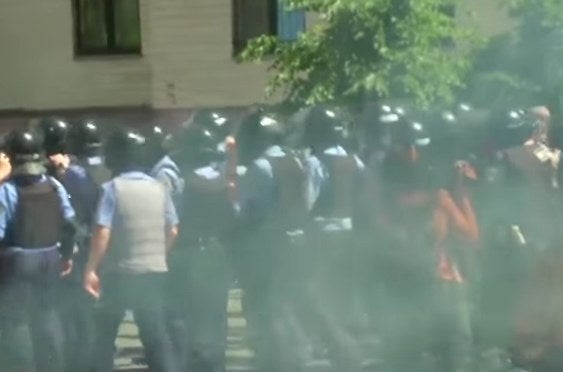

Tear gas, Ukrainian police, and LGBT marchers with drums.
Gough is active on Twitter, writes most of her own tweets, and, she says, is subjected to abuse from trolls.
“Some of them are quite aggressive,” she says. Are they homophobic?
“No,” she says, pausing. “I rather suspect this interview might lead to a raft of that.”
Judith Gough’s life as an out-lesbian ambassador with a civil partner and two children, tweeting about human rights and championing LGBT activists, is not merely extraordinary but, of course, has only become possible within the last two decades. What, asks BuzzFeed News, would a teenage Judith have made of it all had she known what lay in store?
“I would have been astounded and thrilled,” she says. “I always wanted a job where I could actually make a difference – being a diplomat is not all cocktails and gin parties; it’s hard work, you see all sides of life.” She smiles and looks up. “The other thing I would have been pleased with is having a family life.”
Our time is up and she leads us into the most extravagantly decorated core of the Foreign Office to take pictures. She shows BuzzFeed News a vast painting, the figures in which portray different countries in the Commonwealth. There is a man naked but for maple leaves: Canada. An Australian flag flutters overhead. And down in one corner, there is a black slave child carrying food on his head: Africa. Gough says there have been debates about whether to paint over this depiction – to see a continent represented like this is astonishing – but, she says, the conclusion was to leave it so no one can erase the past. Countries can change.
As Gough poses for photos, with Britain’s ignoble history providing an ornate backdrop, her guard slips. She talks momentarily about her fears about what we are doing and what we have spoken about. Finally, the reason for her earlier underlying anxiety surfaces: Doing this interview, she says, carries a potential personal risk to her.
We walk out into the courtyard towards the exit chatting informally about the people Gough has spoken about – her partner and children, her fellow gay ambassadors, the LGBT people of Ukraine. As she mentions the activists again and turns to march back inside BuzzFeed News catches a determined, righteous look in her eyes, conjuring something she said earlier that hangs over everything she has said: “They are everybody’s sons and daughters.”

